商务英语谈判Business Communication English Script
- 格式:doc
- 大小:59.00 KB
- 文档页数:4
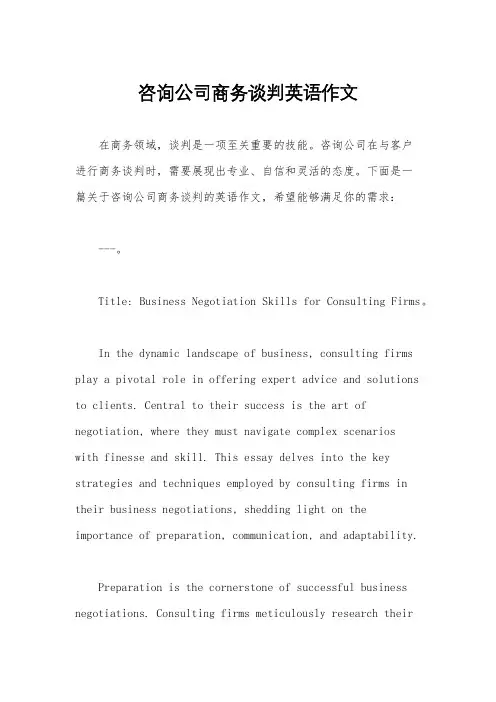
咨询公司商务谈判英语作文在商务领域,谈判是一项至关重要的技能。
咨询公司在与客户进行商务谈判时,需要展现出专业、自信和灵活的态度。
下面是一篇关于咨询公司商务谈判的英语作文,希望能够满足你的需求:---。
Title: Business Negotiation Skills for Consulting Firms。
In the dynamic landscape of business, consulting firms play a pivotal role in offering expert advice and solutions to clients. Central to their success is the art of negotiation, where they must navigate complex scenarioswith finesse and skill. This essay delves into the key strategies and techniques employed by consulting firms in their business negotiations, shedding light on the importance of preparation, communication, and adaptability.Preparation is the cornerstone of successful business negotiations. Consulting firms meticulously research theirclients, industry trends, and potential challenges before entering the negotiation room. This comprehensive understanding empowers them to anticipate objections, identify common ground, and formulate persuasive arguments. By conducting thorough due diligence, consulting firms position themselves as knowledgeable partners capable of delivering value to their clients.Effective communication is another essential component of business negotiations. Consulting firms prioritize clarity, transparency, and active listening throughout the negotiation process. They articulate their proposals succinctly, ensuring that clients grasp the benefits and implications of each solution. Moreover, they actively seek feedback and engage in open dialogue to address any concerns or misunderstandings promptly. By fostering clear and honest communication, consulting firms cultivate trust and credibility with their clients, laying the foundation for mutually beneficial agreements.Flexibility and adaptability are paramount when navigating the twists and turns of business negotiations.Consulting firms recognize that no two negotiations are alike, and unforeseen obstacles may arise at any moment. As such, they remain agile and responsive, ready to pivottheir strategies and explore alternative options as needed. Whether adjusting timelines, revising terms, or exploring creative compromises, consulting firms demonstrate their commitment to finding solutions that meet the evolving needs of their clients.In addition to these overarching strategies, consulting firms leverage a range of specific techniques to enhance their negotiation prowess. They employ principled negotiation principles, focusing on interests rather than positions to foster collaborative problem-solving. They also utilize BATNA (Best Alternative to a Negotiated Agreement) analysis to assess their leverage and walk-away options, empowering them to negotiate from a position of strength. Furthermore, they employ active persuasion techniques, such as framing, storytelling, and value creation, to influence decision-making and secure favorable outcomes.In conclusion, effective business negotiation is a cornerstone of success for consulting firms. Byprioritizing preparation, communication, and adaptability, consulting firms can navigate complex negotiations with confidence and finesse. Armed with a deep understanding of their clients' needs and industry dynamics, coupled with strong communication skills and a flexible mindset, consulting firms can forge enduring partnerships and drive tangible results for their clients. As the business landscape continues to evolve, mastering the art of negotiation will remain a critical skill for consulting firms seeking to thrive in an increasingly competitive environment.--。
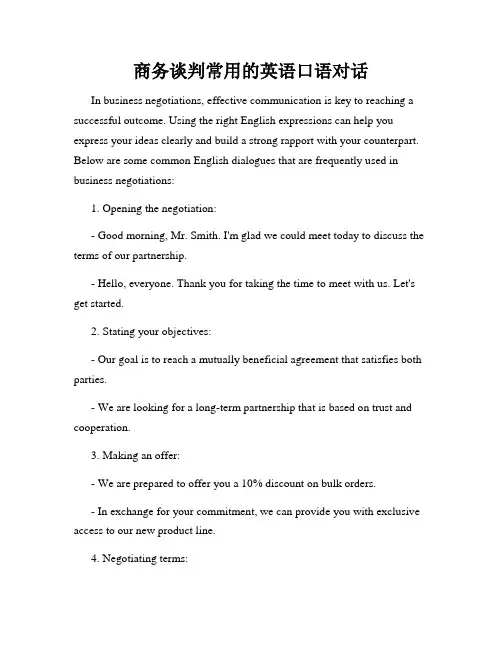
商务谈判常用的英语口语对话In business negotiations, effective communication is key to reaching a successful outcome. Using the right English expressions can help you express your ideas clearly and build a strong rapport with your counterpart. Below are some common English dialogues that are frequently used in business negotiations:1. Opening the negotiation:- Good morning, Mr. Smith. I'm glad we could meet today to discuss the terms of our partnership.- Hello, everyone. Thank you for taking the time to meet with us. Let's get started.2. Stating your objectives:- Our goal is to reach a mutually beneficial agreement that satisfies both parties.- We are looking for a long-term partnership that is based on trust and cooperation.3. Making an offer:- We are prepared to offer you a 10% discount on bulk orders.- In exchange for your commitment, we can provide you with exclusive access to our new product line.4. Negotiating terms:- Can we discuss the possibility of extending the payment deadline by an additional 30 days?- We are willing to compromise on the price if you can guarantee a minimum order quantity.5. Responding to offers:- Your proposal is very attractive. However, we would like to negotiate the delivery schedule.- We appreciate your offer and will consider it carefully before making a decision.6. Seeking clarification:- Could you provide more details on the warranty terms for this product?- I'm not clear on the pricing structure. Could you break it down for me?7. Closing the deal:- It seems like we have reached a consensus on the terms. Shall we draw up a contract?- I believe we have addressed all the issues. Let's finalize the agreement and move forward.Remember, effective communication in business negotiations requires active listening, clear expression, and a willingness to compromise. By using these common English dialogues, you can improve your negotiation skills and achieve successful outcomes in your business dealings.。
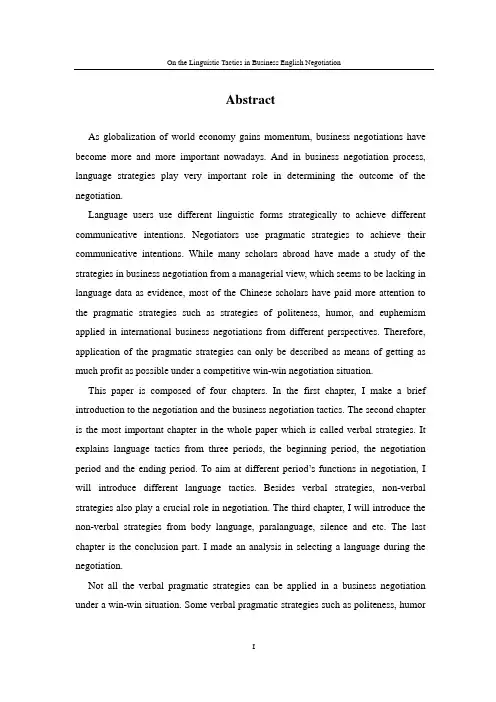
AbstractAs globalization of world economy gains momentum, business negotiations have become more and more important nowadays. And in business negotiation process, language strategies play very important role in determining the outcome of the negotiation.Language users use different linguistic forms strategically to achieve different communicative intentions. Negotiators use pragmatic strategies to achieve their communicative intentions. While many scholars abroad have made a study of the strategies in business negotiation from a managerial view, which seems to be lacking in language data as evidence, most of the Chinese scholars have paid more attention to the pragmatic strategies such as strategies of politeness, humor, and euphemism applied in international business negotiations from different perspectives. Therefore, application of the pragmatic strategies can only be described as means of getting as much profit as possible under a competitive win-win negotiation situation.This paper is composed of four chapters. In the first chapter, I make a brief introduction to the negotiation and the business negotiation tactics. The second chapter is the most important chapter in the whole paper which is called verbal strategies. It explains language tactics from three periods, the beginning period, the negotiation period and the ending period. To aim at different period’s functions in negotiation, I will introduce different language tactics. Besides verbal strategies, non-verbal strategies also play a crucial role in negotiation. The third chapter, I will introduce the non-verbal strategies from body language, paralanguage, silence and etc. The last chapter is the conclusion part. I made an analysis in selecting a language during the negotiation.Not all the verbal pragmatic strategies can be applied in a business negotiation under a win-win situation. Some verbal pragmatic strategies such as politeness, humorand euphemism can be applied successfully and effectively under win-win negotiation situations。
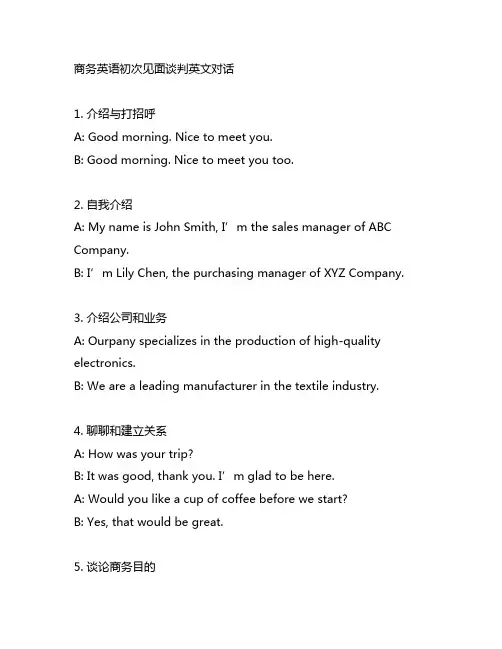
商务英语初次见面谈判英文对话1. 介绍与打招呼A: Good morning. Nice to meet you.B: Good morning. Nice to meet you too.2. 自我介绍A: My name is John Smith, I’m the sales manager of ABC Company.B: I’m Lily Chen, the purchasing manager of XYZ Company.3. 介绍公司和业务A: Ourpany specializes in the production of high-quality electronics.B: We are a leading manufacturer in the textile industry.4. 聊聊和建立关系A: How was your trip?B: It was good, thank you. I’m glad to be here.A: Would you like a cup of coffee before we start?B: Yes, that would be great.5. 谈论商务目的A: We are here to discuss the possibility of a long-term business partnership.B: That’s exactly why we are here as well.6. 谈论产品和服务A: We offer a wide range of products withpetitive prices and excellent after-sales service.B: We are looking for reliable suppliers with high-quality products and good customer support.7. 谈判条件和要求A: We are willing to discuss the terms and conditions of the partnership.B: We have some specific requirements regarding the quality and delivery time.8. 提出建议和反馈A: We can offer customized solutions to meet your needs.B: It’s important for us to have a stable supply ch本人n andpetitive pricing.9. 结束谈话A: It was great meeting you. We will be in touch soon.B: Thank you for your time. We look forward to further discussions.以上是一段商务英语初次见面谈判的英文对话示例,希望对您有所帮助。
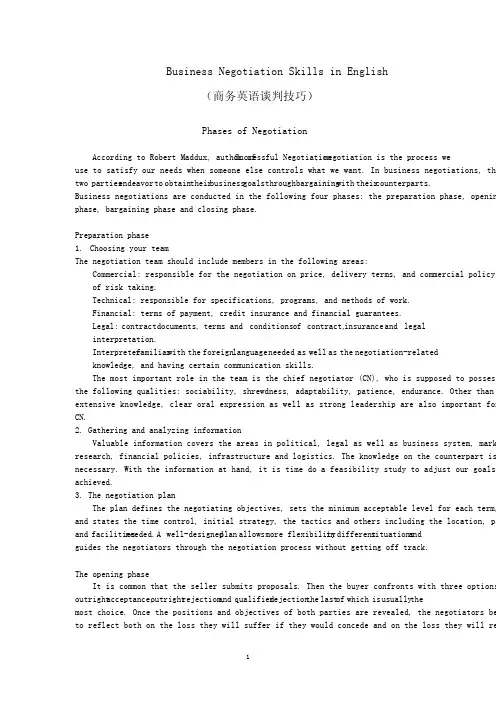
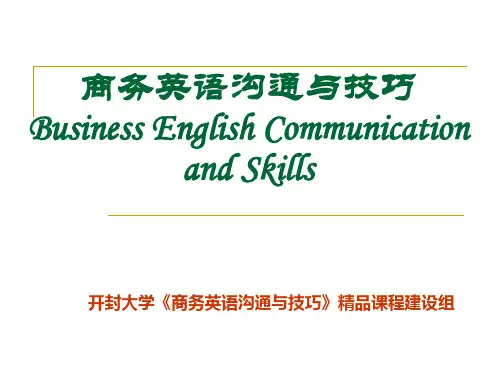
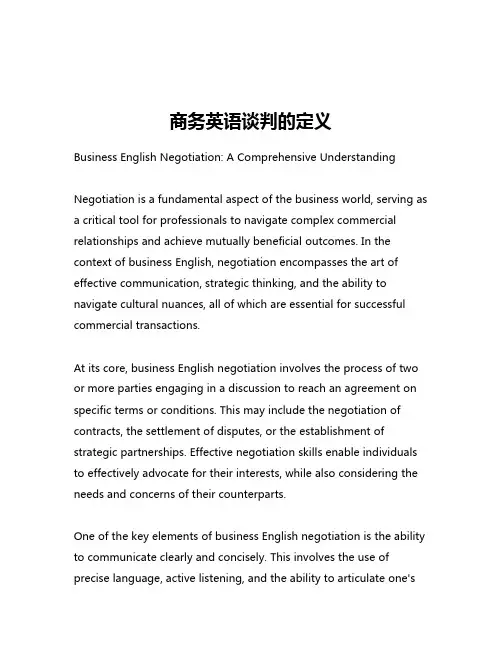
商务英语谈判的定义Business English Negotiation: A Comprehensive UnderstandingNegotiation is a fundamental aspect of the business world, serving as a critical tool for professionals to navigate complex commercial relationships and achieve mutually beneficial outcomes. In the context of business English, negotiation encompasses the art of effective communication, strategic thinking, and the ability to navigate cultural nuances, all of which are essential for successful commercial transactions.At its core, business English negotiation involves the process of two or more parties engaging in a discussion to reach an agreement on specific terms or conditions. This may include the negotiation of contracts, the settlement of disputes, or the establishment of strategic partnerships. Effective negotiation skills enable individuals to effectively advocate for their interests, while also considering the needs and concerns of their counterparts.One of the key elements of business English negotiation is the ability to communicate clearly and concisely. This involves the use of precise language, active listening, and the ability to articulate one'sposition in a manner that is both persuasive and respectful. Successful negotiators must possess a strong command of business-specific vocabulary, as well as an understanding of the cultural and contextual factors that may influence the negotiation process.In addition to effective communication, successful business English negotiation also requires a deep understanding of the underlying issues and objectives at play. Negotiators must be able to analyze the relevant data, identify potential areas of compromise, and develop strategic approaches that maximize the chances of a favorable outcome. This may involve the use of analytical tools, such as cost-benefit analysis or scenario planning, to inform the decision-making process.Cultural awareness is another critical component of business English negotiation. Negotiators must be mindful of the cultural norms and expectations of their counterparts, and adapt their communication and negotiation strategies accordingly. This may involve understanding the importance of hierarchy, the role of personal relationships, or the significance of nonverbal communication in different cultural contexts.Effective business English negotiation also requires the ability to manage emotions and maintain composure under pressure. Negotiators must be able to remain calm and focused, even in theface of challenging or adversarial situations. This involves the development of emotional intelligence, which enables individuals to recognize and regulate their own emotions, as well as those of their counterparts.Finally, successful business English negotiation often requires the ability to think creatively and explore innovative solutions. Negotiators must be willing to think outside the box, consider alternative approaches, and find mutually beneficial outcomes that meet the needs of all parties involved.In conclusion, business English negotiation is a complex and multifaceted process that requires a diverse set of skills and knowledge. Effective negotiators must possess strong communication abilities, strategic thinking, cultural awareness, emotional intelligence, and a willingness to explore creative solutions. By mastering these skills, professionals in the business world can navigate complex commercial relationships, achieve their desired outcomes, and contribute to the overall success of their organizations.。
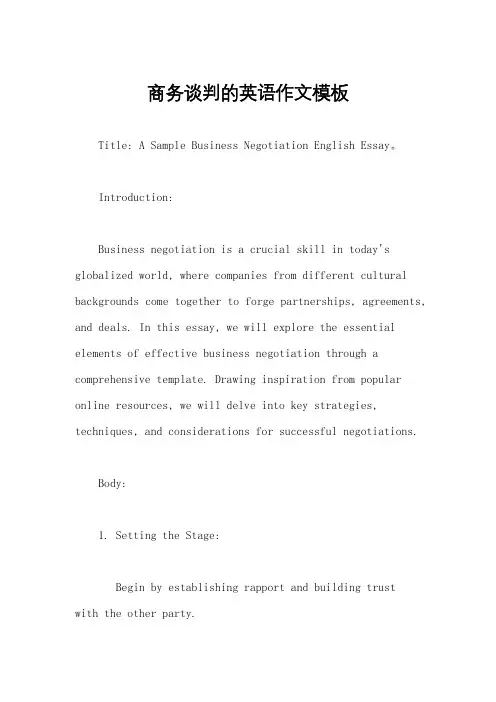
商务谈判的英语作文模板Title: A Sample Business Negotiation English Essay。
Introduction:Business negotiation is a crucial skill in today's globalized world, where companies from different cultural backgrounds come together to forge partnerships, agreements, and deals. In this essay, we will explore the essential elements of effective business negotiation through a comprehensive template. Drawing inspiration from popular online resources, we will delve into key strategies, techniques, and considerations for successful negotiations.Body:1. Setting the Stage:Begin by establishing rapport and building trustwith the other party.Clearly define the objectives and desired outcomesof the negotiation.Outline the agenda and ground rules to ensure a structured and productive discussion.2. Understanding Interests and Positions:Encourage open communication to uncover each party's interests, needs, and concerns.Distinguish between positions (what each party wants) and interests (the underlying motivations).Use active listening techniques to demonstrate empathy and understanding.3. Creating Value:Explore potential areas of mutual benefit and collaboration.Brainstorm creative solutions that address both parties' interests.Emphasize the importance of win-win outcomes for long-term partnerships.4. Communication and Persuasion:Use clear and concise language to articulate your points.Support your arguments with data, evidence, and examples.Use persuasive techniques such as storytelling and framing to influence the other party's perspective.5. Managing Conflicts:Acknowledge and address any conflicts or disagreements that arise.Focus on finding common ground and constructive solutions.Utilize conflict resolution strategies such as compromise, collaboration, or mediation.6. Negotiating Tactics:Familiarize yourself with various negotiation tactics, such as anchoring, framing, and concession strategies.Be prepared to adapt your approach based on the dynamics of the negotiation.Maintain flexibility while staying true to your objectives and principles.7. Closing the Deal:Summarize the key points and agreements reachedduring the negotiation.Clarify any remaining questions or concerns.Formalize the agreement through written documentation or contracts.Conclusion:Effective business negotiation requires a combination of preparation, communication, and interpersonal skills. By following a structured approach and applying proven strategies, negotiators can navigate complex discussions and achieve mutually beneficial outcomes. Whether brokering deals, resolving conflicts, or building partnerships, mastering the art of negotiation is essential for success in the competitive world of business.(Note: The above template provides a comprehensive framework for writing a business negotiation essay, drawing inspiration from popular online resources. The essay can befurther elaborated with real-life examples, case studies, and personal insights to enhance its depth and relevance.)。
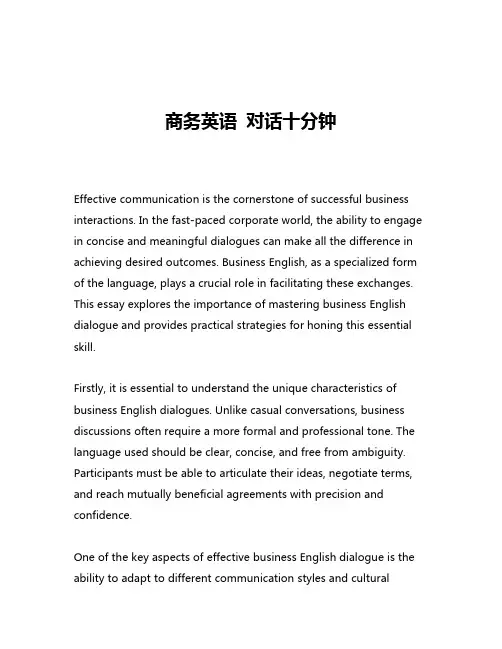
商务英语对话十分钟Effective communication is the cornerstone of successful business interactions. In the fast-paced corporate world, the ability to engage in concise and meaningful dialogues can make all the difference in achieving desired outcomes. Business English, as a specialized form of the language, plays a crucial role in facilitating these exchanges. This essay explores the importance of mastering business English dialogue and provides practical strategies for honing this essential skill.Firstly, it is essential to understand the unique characteristics of business English dialogues. Unlike casual conversations, business discussions often require a more formal and professional tone. The language used should be clear, concise, and free from ambiguity. Participants must be able to articulate their ideas, negotiate terms, and reach mutually beneficial agreements with precision and confidence.One of the key aspects of effective business English dialogue is the ability to adapt to different communication styles and culturalnuances. In a globalized business environment, professionals often engage with colleagues, clients, and partners from diverse backgrounds. Understanding and respecting these cultural differences can significantly enhance the quality of the dialogue and foster stronger relationships.For instance, in some cultures, a more indirect communication style is preferred, where the speaker may hint at their intentions rather than stating them directly. In contrast, other cultures value a more direct approach. Recognizing these differences and adjusting one's communication style accordingly can greatly improve the flow and effectiveness of the dialogue.Another crucial component of business English dialogue is the mastery of specialized vocabulary and terminology. Business professionals must be familiar with industry-specific jargon, financial terms, and legal concepts to ensure that the dialogue is meaningful and relevant to the context. Regularly reviewing and expanding one's business English vocabulary can significantly enhance one's ability to engage in productive discussions.Furthermore, the structure and organization of the dialogue play a vital role in its success. Effective business English dialogues often follow a specific format, including opening the conversation, presenting the agenda, discussing key points, and reaching aconclusion. Adhering to this structure can help ensure that the dialogue remains focused, efficient, and productive.Active listening is another essential skill in business English dialogue. Participants must be able to fully comprehend the information being presented, ask relevant questions, and provide thoughtful responses. This not only demonstrates engagement but also helps to build trust and foster collaborative problem-solving.In addition to the linguistic aspects of business English dialogue, nonverbal communication also plays a significant role. Body language, eye contact, and tone of voice can convey important subtext and influence the overall dynamic of the conversation. Developing an awareness of these nonverbal cues and using them effectively can further enhance the quality of the dialogue.Lastly, the ability to handle challenging situations and negotiate effectively is crucial in business English dialogues. Professionals must be prepared to address conflicts, disagreements, and unexpected obstacles with composure and diplomacy. Developing strategies for active listening, empathy, and win-win negotiation can help navigate these challenging situations and achieve favorable outcomes.In conclusion, mastering business English dialogue is a critical skill for professionals operating in the global business landscape. Byunderstanding the unique characteristics of this form of communication, adapting to cultural differences, and honing specialized vocabulary and organizational skills, individuals can greatly enhance their ability to engage in effective and productive dialogues. Furthermore, the development of active listening, nonverbal communication, and negotiation skills can further strengthen one's business English dialogue capabilities. Ultimately, the mastery of this essential skill can lead to improved professional relationships, increased productivity, and greater overall success in the business world.。
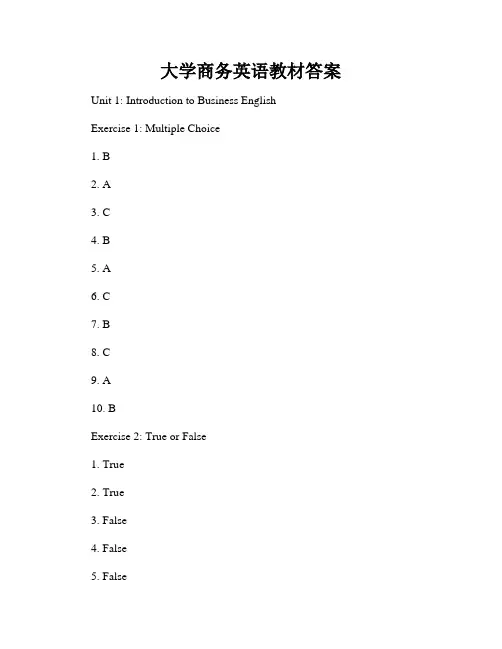
大学商务英语教材答案Unit 1: Introduction to Business EnglishExercise 1: Multiple Choice1. B2. A3. C4. B5. A6. C7. B8. C9. A10. BExercise 2: True or False1. True2. True3. False4. False5. FalseExercise 3: Fill in the Blanks1. global2. multinational3. economy4. communication5. negotiationsExercise 4: Sentence Completion1. facilitate2. enhance3. crucial4. proficient5. interactUnit 2: Business Communication Exercise 1: Matching1. G2. C3. B4. E5. I6. A7. H8. D9. FExercise 2: Sentence Transformation1. Could you please provide me with the necessary information?2. I would appreciate it if you could send me the report by Friday.3. I was wondering if you would be available for a meeting next week.4. I am writing to inquire about the possibility of a collaboration.5. Can you let me know if there are any available vacancies in your company?Exercise 3: Business Letter Writing[Your Name][Your Position][Your Company][Date][Recipient's Name][Recipient's Position][Recipient's Company][Address]Dear [Recipient's Name],I am writing to express my interest in [specific product/service] offered by your company, as advertised in [source]. Having thoroughly researched the market, I believe that your product/service aligns perfectly with our company's requirements.At [Your Company], we strive to provide our clients with top-quality solutions to enhance their business operations. After reviewing your product/service, we are confident that it can bring significant benefits to our organization. We are particularly impressed with [specific feature/benefit] and believe it would greatly streamline our processes.I would like to request additional information regarding yourproduct/service, such as pricing options, implementation process, and customer support. Additionally, if possible, I would appreciate the opportunity to arrange a demonstration or trial to assess its suitability for our needs.Please find enclosed a copy of our company profile for your reference. Should you require any further details or have any questions, please do not hesitate to contact me directly at [your contact information]. I look forward to your prompt response.Thank you for considering our inquiry. We eagerly anticipate the possibility of collaborating with your esteemed company and achieving mutual success.Yours sincerely,[Your Name]Exercise 4: Role PlayStudent A:You are a sales manager from Company A. Introduce your company's latest product, highlighting its unique features and advantages. Try to convince Student B to consider purchasing the product for their company.Student B:You are a procurement manager from Company B. Listen attentively to Student A's sales pitch and ask relevant questions to gather more information about the product. Express your concerns and negotiate terms if interested.Unit 3: Business EtiquetteExercise 1: Multiple Choice1. C2. A3. B4. A5. C6. B7. A8. C9. B10. AExercise 2: True or False1. False2. True3. False4. True5. FalseExercise 3: Fill in the Blanks1. punctuality2. protocol3. initiative4. etiquette5. appropriateExercise 4: Role PlayStudent A:You are a company executive visiting a foreign country for a business meeting. Familiarize yourself with the local customs and etiquette. Discussthe importance of building relationships before conducting business and emphasize the need for respectful behavior.Student B:You are a local representative from the foreign country. Welcome Student A to your country and share insights on the cultural customs and etiquette. Highlight the significance of hierarchy, gift-giving, and dining etiquette. Encourage open-mindedness and a willingness to adapt.注意:以上答案仅供参考,不同教材可能存在差异,请以实际教材为准。
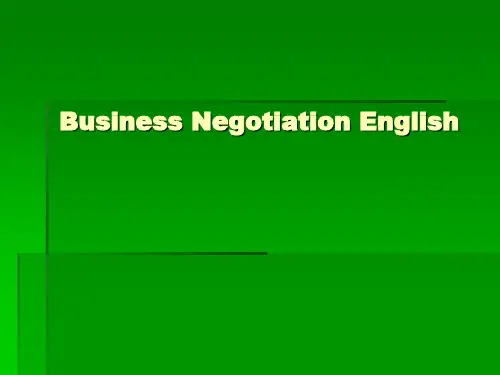
商务英语优秀对话范文Sure! I can help. I'll write a conversation on the topic of business English communication. Let's begin!Being able to effectively communicate in English is crucial for success in the business world. The ability to understand and express ideas clearly can make a significant difference in various business situations.在商务世界中,能够有效地用英语进行交流对于成功至关重要。
清晰表达和理解想法的能力可以在各种商业场合中产生重大影响。
For example, during negotiations, being able to articulate your position and understand the other party's perspective can lead to mutually beneficial agreements.例如,在谈判过程中,能够表达自己的立场并理解对方的观点可能会导致互惠互利的协议。
Furthermore, when giving presentations, clear and effective communication can captivate the audience and convey the intended message with impact.此外,在做演讲时,清晰有效的沟通可以吸引观众,产生影响并传达预期的信息。
In addition, in written communication such as emails and reports, proper use of business English can enhance professionalism and credibility.此外,书面沟通,如电子邮件和报告中,正确使用商务英语可以增强专业性和可信度。
商务英语谈判技巧谈判中有时仅靠以理服人,以情动人是不够的,毕竟双方最关心的是切身利益,断然拒绝会激怒对方,甚至交易终止。
商务英语谈判技巧有哪些?下面店铺整理了商务英语谈判技巧,供你阅读参考。
商务英语谈判技巧:谈判对话Dialogue 1A: Is there any way you can cut us a better deal on your wholesale price for this order?B: We did the best that we could to give you a low price. Did you get our latest estimate?A: Based on the estimate you gave us, by the time we figure in transportation and other expenses, our profit is shot. With the offer you’ve given us, we’re making next to nothing. Can’t you do any better?B: I’ve already given you a discount of 20% off of what we normally charge… if I go any lower, we’ll have loss on the project.I really want to work with you on this, but we’ve already gone as low as we could go.A: To be honest… Our budgeted cost can’t exceed more than $150 dollars per unit. That’s our bottom line. If you can meet that price, you will get a deal. Otherwise…B: I’ll say that… I’ll go over the numbers again with our fina ncial team and see what I can do. I can’t give you any guarantees, but I’ll try.Dialogue 2A: You’ve got the email with all the specifications for the project from us, we’ll be accepting bids until noon on Tuesday, if you have any questions in the meantim e, please let me know…B: Actually, I do have a question. We’d like to know whatyou had in mind for a budget on this project. We’re hoping to put together a really competitive bid, but at the same time, we’d like to hit your target price too.A: I understand, but unfortunately it is our policy not to disclose our bottom line. You can be assured that price is a weighty consideration when we review the proposals, but we also take other elements into consideration, including design and practicality. We also give weight to the reputation of the submitting company.B: Do you have any price range? Is there any way you can give me some ideas of which direction to go, or how high is too high?A: We are just looking for a reasonable price according to the specificat ions in our project blueprint. That’s all I can say.安格英语老师认为学会迂回是谈判中非常重要的一项技能,而选择何时亮出自己的底线也需要大家在职场中多年的实践和学习才能够灵活地掌握。
商务英语谈判英语Effective business negotiation is a critical skill for professionals in today's global marketplace. The ability to successfully navigate complex commercial discussions and reach mutually beneficial agreements is essential for driving business growth and fostering productive partnerships. Business English, as the lingua franca of international commerce, plays a pivotal role in facilitating these high-stakes negotiations.At the heart of effective business English negotiation lies clear and concise communication. Negotiators must be able to articulate their objectives, interests, and constraints with precision, while also actively listening to understand the perspectives of their counterparts. This requires a strong command of business-oriented vocabulary, idiomatic expressions, and rhetorical techniques that can convey nuanced messages and persuasive arguments.One of the key aspects of business English negotiation is the ability to build rapport and establish trust with negotiating partners. This involves not only linguistic proficiency but also cultural awarenessand sensitivity. Successful negotiators must be able to adapt their communication styles to align with the cultural norms and expectations of their counterparts, whether they are from the same or different cultural backgrounds.Effective business English negotiation also demands strategic planning and preparation. Negotiators must thoroughly research the market, industry, and their counterparts to anticipate potential challenges, identify areas of common ground, and develop a negotiation strategy that aligns with their overall business objectives. This includes the ability to analyze complex financial and legal information, as well as the capacity to think critically and creatively to devise innovative solutions.Moreover, business English negotiation often involves the use of specialized terminology and concepts related to finance, law, and other relevant domains. Negotiators must be well-versed in these areas to ensure they can effectively communicate and understand the implications of the agreements they are negotiating.In addition to linguistic and technical competence, successful business English negotiation also requires a range of interpersonal skills. Negotiators must be able to manage emotions, both their own and those of their counterparts, to maintain a constructive dialogue and find common ground. They must also be skilled in conflictresolution, problem-solving, and decision-making to navigate the complexities of high-stakes negotiations.Furthermore, the digital age has introduced new challenges and opportunities for business English negotiation. With the increasing prevalence of virtual and hybrid negotiation formats, negotiators must be adept at using various communication technologies and platforms to engage effectively with their counterparts, while still maintaining the personal touch and rapport-building that are essential for successful outcomes.In conclusion, effective business English negotiation is a multifaceted skill that requires a combination of linguistic proficiency, cultural awareness, strategic planning, technical expertise, and interpersonal capabilities. By mastering these essential elements, professionals can navigate the complex world of international business negotiations with confidence and achieve mutually beneficial outcomes that drive their organizations forward.。
Keys to the exercisesChapter 1 Fundamentals of International Business NegotiationCommunication Exercises1. Change the sentences from negative to positive.1) I want a job.2) I work hard.3) My job is terrific.4) This office is great.5) My co-workers are super.6) The Personnel Director is nice.7) My health is good.8) My attitude is positive.9) I make a good impression.10) I understand.2. Change or add to these sentences so that they do not just state what you want, but invite your negotiating partner’s opinion.a) Could we finish at five---if that’s all right with you?b) I hope you don’t mind if Miss Li sits in during the negotiation?c) Perhaps we could take a break now. Is that OK?d) Could we look at these three areas this morning?e) I would like to go through the written offer clause by clause, if that’s OK?f) Do you mind if I answer your questions at the end?3. What is meant by “negotiation”? How would you define “negotiation”?A negotiation is a me eting in which both parties need each other’s agreement to reach a specific objective. It is the mechanism by which people trade things of value in a civilized manner. Negotiation depends on communication. It occurs between individuals acting either for themselves or as representatives of organized groups. Negotiations are very much part of working and home life. Negotiations could be either internal or external, long or short, formal or informal. The goal of negotiation is not to win but to succeed. The mechanism of successful negotiation is collaboration.In negotiations, both parties should know----why they negotiate----who they negotiate with----what they negotiate about----where they negotiate----when they negotiate----how they negotiatemechanism [ ] n.---- a process by which something is done or comes intobeing途径4. Fill in the blankshuman, negotiable, interest, giving, trust5. Answer the following questions1) Physical or survival needs; Security and safety needs; Social needs; Ego oresteem needs; Self-realization needs2) Exploration, bidding, bargaining, settling and ratifying.6. Put the following into English1) Are you negotiable?2) I'm sure there is some room for negotiation.3) Before we have anything to negotiate, you have to make me an offer.4) We could add it to the agenda.5) Would anyone like something to drink before we begin?6) See what I can do.7) I would if I could.8) I know I can count on you.9) We'll come out from this meeting as winners.10) I'll try to make you happy.7. True or false1) T 2) T 3) T 4) F (Everything is negotiable.)5) F (bargaining stage)6) F ( Do not often. Sometimes they will follow the sequence n one aspect of thedeal and then start all over again on a second aspect.)7) T8) F (May not. Because either side may be wiling to say what it thinks or take aposition and stick to it )9) T 10)Negotiation skills1.What determines a success in negotiation? Success in negotiation is when the parties to the negotiation reach an agreement to which they are both committed and which they will implement in full.committed [ ☜❍♓♦♓♎] v.----尽责的implement [ ♓❍☐●♓❍☜⏹♦] v.----to put into practical effect; carry out使生效;执行2. What are the elements of a successful negotiation process?There are seven basic elements that should be considered when analyzing the negotiation process:a.The relationship among the parties.b.The parties' interests -- why they need to reach their stated objectivesc.An understanding of the choices available if the parties cannot reachagreement, often called their BATNA -- Best Alternative To a Negotiated Agreementd.Creativity which will expand the bargaining choices among which the partiescan choose to reach agreemente.Fairness -- a person who negotiates unfairly may be able to force an agreement,but the 'forced' party will be reluctant to fulfill their share of the agreementf.Whether commitment has been reached. Will the parties each feel committedto doing what they have agreed? Is each party capable of fulfilling their share of the deal?g.Negotiation is all about communicating information. If one party knowseverything then why do they need to negotiate with anyone else?And the foundation of good negotiation is preparation. Be prepared and the negotiation will bring a result that really works. If well prepared you are less vulnerable to surprise, and that increases the likelihood you'll be happy with the result.vulnerable [ ✈●⏹☜❒☜♌☎☜✆●] adj.----易受攻击的, 易受...的攻击3. Your client comes into your office and is exceedingly grumpy and difficult to talk to. How do you approach your client so as to make your meeting as productive as possible?Answer: (e)When the client is grumpy, their emotions will inevitably cloud their judgment and make it difficult to interact with them on substantive matters. At the same time, if they are experiencing anger, it is important to ensure them that we understand that they are upset. By acknowledging the client's anger and offering our assistance, the client will feel as though we are on the "same side" and treat us as friends and continue to direct their anger elsewhere- allowing us to focus on the substantive issues.substantive [ ♦✈♌♦♦☜⏹♦✋] adj.----of or relating to the essence 实质的Chapter 2 Proper Behaviors in International Business Negotiation Communication Skills1. What would you say if…a.Thank you./No, after you.b.Thanks. I’ll need it.c.Thanks. That’s very kind.d.Thanks for coming all the way.e.Thanks for helping. That was very kind of you.f. Thank you for thinking of me, but I’m afraid I can’t take it.2. Answer the following questions.(1) Only about half of what he or she heard(2) Not only does note taking force you to listen carefully, but it alsopsychologically throws the speaker off the balance when he or she sees you nodding and furiously writing away and having a record of all the facts and basically everything said. A further benefit of note taking is that you have the perfect excuse to avoid eye contact if you are afraid to reveal your reactions to someone’s proposals(3) Questions appear to be able to be divided into five basic functions:①Cause attention.②Get information.③Give information.④Start thinking.⑤Bring to conclusion.(4) There are two ways to assure a high degree of reliability for answers to yourquestions. One way is to lay the foundation for asking them. The second is through the use of the tactic called “bipolar questioning.”(5) A firm handshake gives the impression of quiet confidence and says that thisperson is glad to meet you.3. Choose the best answer.(1) D (2) C (3) B (4) A (5) (6) D (7) B (8) C (9) A (10)A4. Translate the following into English.(1) There’s a great demand for our new product.(2) This product has good prospects.(3) We need to talk about the basic terms of the transaction.(4) If your prices are reasonable and the quality is satisfactory, we shall placesubstantial orders with you.(5) It’s unwise for both of us to insist on his own price. Can we each make someconcession?(6) If you cannot reduce your price, we’d rather call the whole de al off.(7) If you want to expand your business in this market, you have to take flexibleways in adopting payment terms.(8) We regret that we cannot accept your demand for direct shipment.(9) This product has many advantages compared to other competing products.(10)I’m very glad that we have finally come to an agreement. We’ll go on to otherterms and conditions tomorrow. Is it all right with you?5. True or false.(1) F (2) T (3) F (4) T (5) F (6) T (7) F (8) F (9) F (10) TNegotiation Skills1. The person you are negotiating with continually repeats the same argument despite the fact that you have given them a number of counterarguments. What do you do to move the negotiation forward?Answer: (a)One of the most powerful tools in negotiation is how to listen to what the other party is saying. Very often, we are too focused on the points we are trying to get across to listen to what our counterparts are trying to say.If people keep repeating themselves, they are subconsciously sending a signal that they feel what they are saying is important. And they want us to acknowledge that we have heard and understand them.Accordingly, the best thing to do in this situation is to rephrase what they keep repeating and ask them if we have accurately restated their point. Only when they feel as though they have been heard will they be able to listen to usEffective listening involves much more than simply hearing and understanding what the counterpart is saying. Effective listening is a set of tools and techniques which expert negotiators use to gain control of the negotiation and turn it to their advantage.2. What are the key communication skills used in negotiation?The key communication skill in negotiation is to listen. There's an old saying: God gave us one mouth and two ears, and we should use them in that ratio.Obviously when we are listening, we need to be listening for useful information. Thus it is very important to plan ahead, thinking about what we can learn that will help us decide what approach to take and to learn about what appeals to the parties with whom we are negotiating. So think about the questions you're going to ask; the result should reward your listening with real problem-solving information.Chapter 3 Choosing the Negotiation TeamCommunication Exercises1. What is the more indirect question or statement behind the following sentences?a. I’m not entirely convinced by these forecasts.b.We’d like to know something about your planning.c.I’d be interested to hear a bit abou t payment.d.Your costs could cause one or two problems.e.Perhaps we could talk a little bit about figures.f.That figure looks a little on the high side.g.Delivery is an area which we’d like to explore a little further with you.h.I’d like to know more about your management structure.1.Write the name of the position in the blank.1) CEO/the president2) Assistant Manager, Europe3) Purchasing Clerk4) Personnel Assistant5) Vice-President, Administration3. (omitted)4. (omitted)5. Fill in the blanks1)maximum2) observers; advisers; speaking; training6. Translate the following into English1)Negotiation is a team sport.2)The negotiator’s function is to negotiate, while the functional specialists provide specialist advice or information.3) The team leader is the person who generates enthusiasm in his team to maintainsthe morale under all conditions.4) The team members must learn that the opponent and its representatives areadversaries although they may be friendly.5)I’m afraid you are not in our ballpark.6) Excuse me, but it seems to me we’re giving up too much in this case.7)That’s to o great a financial burden for us.8) 10% is beyond my negotiating limit.9)If you can guarantee that on paper, I think we can discuss this further.10)Could you explain what you mean by that?7. True or false1). F 2). T 3). T 4). F (maximize) 5). T 6). F (can’t)7). F (both sides) 8). T 9). T 10). F (There is no need to )Negotiation skills1. What do you think are the personal qualities of a good negotiator?A good negotiator needs to be:1) A good listener2)Open-minded3)Willing to do the homework to determine her/his interests, objectives,and alternatives4)Well-prepared5)Creative6)Able to merge what he knows about his own interests and resourceswith the interests and resources of his negotiation partner7)Someone who is always learning from experience, from other peopleand from historymerge [❍☜♎✞] v. ----to combine or unite 使合并或结合2. How to be a cool negotiator?Acting cool is a good part of successful negotiation. But one needs to make sure it is not just an act. The 'coolness' needed for successful negotiation really means keeping a cool analytical head. If there is any chance one should prepare ahead of time: what do I want and why do I want it? What do they want and why do they want what they want?During the process, one should find ways to take a step back from the discussion and look at what is going on with that same cool head. 'Why did he say that? What arguments or tactics are being used?3. How to control anger for effective negotiating?When tempted to get angry, remember to check whether or not it is your turn. If it is someone else's turn to get angry, sit there and take it by reminding you how wonderful you are to be in such control of your emotions.One fundamental rule is: only one person can be angry at a time. Don't let thesituation escalate, civility will slip away awfully quickly and there will be a very tough time healing the relationship or solving the initial issue.civility [♦♓♓●♓♦♓] n. ----a courteous act or utterance有礼貌的举止或表达4. What are the advantages and disadvantages of team negotiations?Negotiating as part of a team requires very careful preparation. The biggest danger in team negotiation is that your counterparts will see or hear that you and your colleagues don't agree with each other. If they can find differences, they may spot opportunities to drive wedges between your team members.wedge [♦♏♎✞] n.----something that intrudes and causes division or disruption侵入引起分裂的东西Teams can work together ahead of time on strategy: who is going to be thespokesperson on which issues? What information do we need and who is going to ask the relevant questions? Who can communicate what decisions to the 'other side'?What members of the team are the experts on technical matters, business matters, etc.?But even if a group of colleagues work hard at developing a commonly agreed strategy you will find that, there is still a risk that someone will say something out of turn or which is not part of his role. They need to explore how to cope with such problems during the actual negotiation.Individual negotiations have certain other advantages: the negotiator can present him/herself as the decision-maker or as the spokesperson for their company or colleagues. This gives the individual negotiator considerable flexibility that may not be available in team negotiation situations.Chapter 4 Preparing for NegotiationCommunication Exercises1. What would you say in these situations?1) Mrs Zhang, I’d like you to meet Tracy Morris. She’s our new sales clerk.2) Hello, Kathy. Nice to meet you.3) That’s right. Yes, we once worked together in.4) I’m terribly sorry. I’ve forgotten your name.5) Yes, good morning. My name is … I’ve got an appointment with…6) Did you have a good journey? It’s very nice of you to come all this way.7) Would you like a coffee? Or Would you like something to drink?8) Good heavens, is that the time? I didn’t realize it was so late. I really must begoing now.2. Make these sentences more concise1) He’s an assistant in Personnel.2) She’s the Vice-President in Sales and Marketing.3) He’s the Assistant Manager in Domestic Sales.4) She’s the Manager in International Sales.5) He’s an accountant in Ac counting.3. Combine these sentences as concise as possible1) She is a clerk in Purchasing at ABC Company.2) He’s a salesman in the Asian Pacific Division at Sun Computer Company.3) She’s the Manager of Domestic Sales at Legend Group.4) He’s a secreta ry in Personnel at Huatian Hotel.5) She’s the Vice-President of Administration at Three-One Steel.4. Do you think all negotiations need an agenda? Who should be responsible for controlling a negotiation?Informal negotiations don’t need an agenda. In some cases, you are negotiating just one point. An agenda is often best negotiated rather than imposed at the start of a meeting. Usually the host company should be responsible for controlling the negotiation.5. How can you prepare effectively for a negotiation? What issues do you need to discuss beforehand?The essential preparation areas are firstly to ensure that everyone in the team is clear what the objectives of the negotiation are. The objectives include: What is the best we can get?What’s the wo rst we can get?What is our bottom line?And secondly, to establish the role that each individual is expected to play in achieving those objectives. Namely:Who is responsible for different stages of the negotiation?What special skills/knowledge do individual members of the team have?What do we know about the other team?It is important to discuss strategies beforehand and to decide on the approach the team is going to take which include:What are the main areas of negotiation?What are likely to be the sticking points?What is the best order to discuss these points?What concessions can we give to achieve our main aim?It is also essential to discuss the communicative ways like:how we are going to maintain positive communication,who is taking notes or minutes andwho is going to ask questions and so on.6. Put the following into English1)Please take a look at the itinerary we prepared for you, and let me know if there’s anything inappropriate, please let me know.2)We are holding a banquet here tonight in honor of our friends coming from the other side of the Pacific Ocean.3)I believe that through our joint efforts, our corporation can be satisfactory and successful.4)Let’s come to the point, the purpose of my current visit here is to explore the possibility of doing barter trade with you.5)The contract will come into force from May 10, you can’t go back on your words then.6)We always fulfill our promise.7)Owing to our old relationship, we hold our offer valid for one other week, after which our price would probably be raised.8)I'll do my best; and please, try your best too.9)Your pr ice is too high. It’s hard for us to accept.10)All our products are high-grade commodities; naturally the prices are different.7. True or false1) T 2) F 3) F 4) T 5) T 6) F (unwise) 7) T 8) T9) F (fluid) 10) T 11) F(round table)12) FNegotiation Skills1. In your opinion, what are the benefits of considering your own and others’ outcomes in negotiation preparation?The benefit of considering the outcomes for ourselves and others gives us an initial sense of 'what' people are looking for.It is far more important to look to the interests of the others. The question to ask is why do people want the outcome they are pursuing. It is easy to think of desirable outcomes in terms of money, which is in many cases what people want.When thinking ahead of time about others’ interests, we are making a series of assumptions. We should use the negotiation process to pursue the fundamental asset of negotiation, which is information. Are the assumptions accurate? If the interests assumed are 'out there', the answers we derive should yield a clearer understanding of the actual interests that motivate the parties and will lead to a successful agreement.2. How to measure a negotiator’s strengths and weaknesses?In general, measuring a negotiator's strengths and weaknesses can involve a multiplicity of elements, but the most important are the following:1) A negotiator's relative strength is determined by the quality and extent of his preparation. The better one understand his/her interests and the better he/she understands the interests of other parties, the greater the chance he/she will be able to reach an elegant solution which leaves the parties feeling as if each has achieved the major portion of their goals.2) A negotiator's relative strength can be measured by whether people walk away thinking they would be pleased to negotiate with him again. That is to say----if people leave a negotiation thinking they never want to see him/her again, then he/she is a poor negotiator.3) A negotiator needs to understand that different issues should be treated as of different priorities in different negotiations. Sometimes the relationship is most important; other times creativity is the measure of how well one negotiates. It is always true that good communication is fundamental of a negotiator's strength. Agood negotiator makes his points clearly understood by other parties. A better negotiator makes understanding other parties his top priority.multiplicity n. ----the state of being various or manifold多种多样多方面或者多种形式Chapter 5 The Bargaining ProcessCommunication Exercises1. In the business world, everyone is very busy. Business calls are concise and “to the point.” Remember to be positive. Which is the best expression?1) b 2) a 3) a2. Make proposals about the following:1) I think we should cut the training budget by five per cent.2) I suggest we aim for a two per cent rise in productivity.3) How about going for a meal after work?4)Why don’t we go to the National Forest Park this year for the comp anyexcursion?5) I advise you to reduce production costs.6) I propose that we shorten working hours by two and a half hours per week.3. Use the conditional constructions (if…or unless…) to exert pressure in the following situations.1) I’m afraid we’ll have to cancel the contract unless you reduce your fees.2) We’ll have to choose another supplier if you can’t pay us on time.3) That looks like the end of the negotiation, unless you can make a concession.4) I’m afraid you’ll lose your job unless you w ork harder.5) If you can’t offer me a better working condition than this, I’ll leave thecompany.6) I’ll accept the new job only if I get a higher pay.7) Unless you order 10,000 pieces of this product immediately, you won’t get aquantity discount.4. Once positions have been established in a negotiation, a process of making and responding to proposals usually follows. Which side (the customer or supplier) should start the process? What are the advantages of going first and second?The supplier will usually be expected to start this process the advantage is then given to the customer who doesn’t have t show his hand until he first hears what the supplier is proposing. On the other hand, making a proposal first may set the parameters for discussion and it could be an advantage if you want the negotiation to go in a certain direction.5. What can cause negotiations to fail? How important is it to maintain a positive tone throughout the meeting?Negotiations can fail for a variety of reasons:competitors offer a better deal;problems seem too difficult to solve;personalities clash;negotiating styles clash.Most negotiations will encounter difficult problems. There is a much greater chance that solutions will be found if both parties keep sight of the main objectives and maintain a positive tone.6. Fill in the blanks1). Assess,differences,strengths,next round;2). Fluid,escape routes,time breaks3).Bargaining to our advantage, the skilled negotiator will:a) outsetb) situationc) roundd) satisfactione) Bluff, brinkmanshipf) parallelg) impassesh) written, equal satisfaction7. Put the following into English1) I understand perfectly.2) Let's compromise.3) That's a smart decision.4) I expect to be compensated.5).The longer we wait, the less likely we will come up with anything.6) I'll be expecting your call.7) I'd like to get the ball rolling by talking about prices8) I know your research costs are high, but what I'd like is a 25% discount.9) We'd need a guarantee of future business, not just a promise.10) If you can guarantee that on paper, I think we can discuss this further.6.True or false1). F 2) T 3) F (positive tone) 4) T 5) T6) F (without comment)7) T 8) F (more ) 9) F (high) 10) TNegotiation Skills1. You are negotiating a major purchase, and the sales agent suggests a ridiculously high pricewhich is far above your anticipated purchase price. How do you address the agent in order to get the best price?(b) and (d)The sales agent is trying to get started on the traditional positional bargaining philosophy of "start high, counter low and end up in the middle." In order to counter their attempts at positional bargaining, we should begin by asking them what the basis for their initial price was. This tactic will draw attention away from the initial price and create a focus on the criteria for determining a fair price. Next, we should suggest a price of our own, prove the offer with appropriate criteria and stick to our offer.2. Do you think it’s a good idea to raise the critical issue early in the negotiation? How would you handle the aggressive position immediately adopted by others?Most negotiators start by identifying the common ground. In other words, the points which both sides agreed on. Then have a firm basis to discuss problem areas. It is important that our team do not show too strong an emotional response to the other party’s aggression. Because they will see this as a weakness.3. How to deal with those who say " Our prices are set, we do not bargain "?Businesses were created to meet a perceived need in the marketplace. There are people who fear that if they negotiate, other parties will take advantage of them. This sort of thinking is the result of the belief that negotiation is a competitive process, and only one side can win.The Internet has created a variety of auction choices; many other companies always guarantee the lowest price. So price competition is far from dead. It is simply a matter of people’s choice. If you want to a ttempt to bargain for a better deal, don't do business with no-negotiation companies.Chapter 6 Closing the NegotiationCommunication Exercises1. A positive comment makes people comfortable and ready to listen. Rewrite these sentences.1) Thanks for your understanding. I really appreciate it.2) Thanks for meeting me at the airport. I really appreciate it.3) Thanks for coming early. I really appreciate it.4) Thanks for working overtime. I really appreciate it.5) Thanks for your cooperation. I really appreciate it.2. A polite way to correct someone is to make the correction impersonal. Try not to use the word you. Which is a more polite correction?1) b 2)b 3) b 4) b 5) b 6) a 7) b 8) a3. Look at the expressions below. Which of them would you use to express each of these ideas in negotiating?What would you say in negotiating…if you’ve not understood an explanation? (10)when you want to complain indirectly to someone? (7)if you do not want to accept the advice someone is giving you? (5)when you want to tell someone something? (1)when you wish to agree with someone? (2)when someone you already know is introduced to you? (6)if you want to interrupt someone? (8)when it’s unlikely that you can do something? (3)when you would like a person to do something for you? (9)when you want to give someone some information? (4)4. Make these statements into proposals and suggestions. Be inclusive---use we rather than I. Try to word your sentences so that they encourage feedback.a. Let’s start by looking at the sales figures.b. Perhaps we should identify who our main competitors are first.c. Wouldn’t you agree that timing is essential?d. We think the main problem is the security system. Would you agree?e. Shall we discuss delivery issues at the end?5. Match each underlined expression (a-d) with its meaning from the expressions below and use the appropriate form of one of the expressions to complete the sentences(e-h).a. reduce our pricesb. a bargaining zonec. contingency pland. a tough negotiatore. room to manoeuvref. knock us downg. drives a hard bargainh. fall-back position6. What should happen at the end of a negotiation? What issues need to be agreed on before closing the meeting?It is important to round off a negotiation well, so that nothing remains ambiguous. Before closing the negotiation, the participants need to confirm what exactly has been achieved. They need to agree on future follow-up action and, if possible, set a date for the next or future meetings.7. What steps do you go through to close a negotiation effectively?To close a negotiation effectively we should do the following steps:。
商务英语谈判对话900句在商务领域,英语是一种非常重要的沟通工具。
掌握商务英语谈判对话的技巧将帮助我们更好地进行国际商务合作。
本文将为您介绍900句商务英语谈判对话,帮助您增强谈判能力。
1. Greetings and Introductions(问候与介绍)1.1. Greeting the Counterpart(向对方问候)- Hello, nice to meet you.- Good morning/afternoon/evening.- How are you?1.2. Introducing Yourself(介绍自己)- My name is [Name], and I represent [Company Name].- I am [Name], the CEO of [Company Name].- I work for [Company Name] as the Sales Manager.1.3. Introducing the Team(介绍团队)- I would like to introduce my team. This is [Name], the Marketing Manager, and [Name], the Financial Director.- We have brought our team of experts today. They specialize in [relevant field].2. Establishing Rapport(建立融洽关系)2.1. Complimenting the Counterpart(赞美对方)- I must say, your company has an excellent reputation.- Your product range is truly impressive.- I admire the way you handled the project.2.2. Expressing Interest(表达兴趣)- We are interested in exploring potential business opportunities with your company.- Your product seems to be a perfect fit for our market.- We have been following your company's progress with great interest.2.3. Asking About the Counterpart's Company(询问对方公司情况)- Could you tell me more about your company's history?- What are your company's main products/services?- How long have you been in business?3. Presenting Your Company(介绍自己的公司)3.1. Overview of the Company(公司概况)- Our company was founded in [year] and has since become a global leader in [industry].- We specialize in [products/services] and have a strong customer base worldwide.- Our company is known for its commitment to quality and exceptional customer service.3.2. Highlighting Achievements(突出成就)- We have successfully completed several high-profile projects for major clients.- Our company has received numerous awards for innovation and excellence.- We have achieved double-digit growth in the past few years.3.3. Explaining Competitive Advantage(解释竞争优势)- One of our key strengths is our extensive distribution network.- Our cutting-edge technology gives us a significant edge over our competitors.- We offer customized solutions tailored to our clients' specific needs.4. Discussing Business Opportunities(讨论商机)4.1. Expressing Interest in Collaboration(表达合作兴趣)- We believe that a partnership between our companies would be mutually beneficial.- We are keen to explore potential joint ventures.- Let's discuss how we can work together to achieve our common goals.4.2. Suggesting Collaboration Options(提出合作选择)- We can explore the possibility of a distribution agreement.- Joint product development could be a great opportunity for both our companies.- A strategic alliance could open up new markets for both of us.4.3. Negotiating Terms(谈判条款)- We propose a revenue-sharing model that benefits both parties.- Let's discuss the pricing and payment terms in more detail.- Are you open to offering exclusive rights in our market?5. Closing the Negotiation(结束谈判)5.1. Summarizing the Discussion(总结讨论)- To sum up, we have identified several viable collaboration options.- We have discussed the key terms and are now ready to move forward.- It has been a productive discussion, and we look forward to further collaboration.5.2. Agreeing on Next Steps(达成共识)- Let's schedule a follow-up meeting to finalize the details.- We will prepare a formal proposal for your review.- Our legal team will draw up a draft agreement based on our discussion.5.3. Expressing Appreciation(表达感谢)- Thank you for your time and consideration.- We appreciate the opportunity to discuss our partnership.- We look forward to a fruitful collaboration with your company.以上900句商务英语谈判对话涵盖了商务谈判的各个方面。
商务英语口语实训教程
商务英语口语实训教程(Business English Communication Skills)旨在
帮助学生提高在商务场合中的英语口语表达能力。
通过模拟真实的商务场景,学生可以学习如何运用商务英语进行有效的沟通,包括商务谈判、会议交流、商务报告等。
以下是一些商务英语口语实训教程的基本内容:
1. 商务礼仪:学习各种商务场合中的礼仪和规范,包括称呼、问候、介绍、握手等。
2. 商务沟通技巧:掌握有效的沟通技巧,如倾听、表达、提问、反馈等,以便在商务场合中更好地交流。
3. 商务谈判:学习谈判技巧和策略,包括如何进行报价、还价、达成协议等。
4. 商务会议:了解各种商务会议的类型和流程,学习如何主持和参与会议,以及如何进行报告和演示。
5. 商务信函和电子邮件:学习撰写各种商务信函和电子邮件,包括邀请函、感谢信、通知函等。
6. 跨文化沟通:了解不同文化背景下的商务礼仪和沟通方式,以避免文化冲突和误解。
通过实训教程,学生可以模拟真实的商务场景进行口语练习,提高自己的口语表达能力和自信心。
同时,学生还可以学习到实用的商务技巧和策略,为自己的职业发展打下坚实的基础。
Business Communication English Script Human Potential:Supplier 1: Rebecca ChairwomanSupplier 2: Taylor SecretarySupplier 3: Molly HRSupplier 4: Lydia Project ManagerBaylor and Sons:Customer 1: Vienna ChairwomanCustomer 2: Shirley SecretaryCustomer 3: Daisy Personal Manager Customer 4: Cynthia Market Manager(Daisy, Lydia, Vienna, Tayl or, Molly, Rebecca)Daisy:Sorry to have kept you waiting .You must be Lydia, and I’m Daisy .We’ve spoken on the phone .Let me introduce for you, this is Vienna , and Shirl ey, and Cynthia.Lydia: Morning, nice to meet you.Vienna: I’m very glad to welcome you. Would you like some coffee…or some tea? Rebecca: Coffee, pl ease. ( l ook at Tayl or )Tayl or: No, thank you.Vienna: (drink the coffee)How was your flight?Lydia: About one hour and a half.Molly: That sounds…you nearly have no time to have a breakfast.Lydia: er…a little, on the flight.Vienna: Terribl e, I can’t stand those food on flight.Rebecca: Neither d o I.(Laughing)Daisy: Okay, ladies .We’ve got a full agenda, so perhaps we had better start now. Cynthia:Before the meeting, I’d like to introduce something about our company, especially about what peopl e we really want …(略)(Vienna, Rebecca, Shirl ey, Lydia, Cynthia)Vienna: I’d like to start by saying a few words about the meeting today and what we expect to achieve. As we know, Human Potential as a strong candidate, but, er…actually, not the only one. Even though I hope that we can be good cooperative partners, what we really hope is to find enough common ground .Is that cl ear? Rebecca: That’s all right.Shirl ey: I’ve drawn up an agenda. First, we’d like you to present your proposal. We had read it, but we still hope you can go over the critical areas .Lydia, I und erstand you’ve come compared to d o this?Lydia: It should take about five minutes. Please feel free to ask any questions, whil e I’m talking.Vienna: That’s great. It will help us to id entify issues that need more discussion. After that we try to resolve any outstanding differences and finally, assuming that we can agree, I thought we coul d draw up an action plan for the next few weeks. Cynthia: I just want to ad d that, in fact, because of the restructuring of our company, we really need some categories and numbers of empl oyees seriously. Those can take in office as soon as they can.Lydia: Of course, could we begin?(Almost everyone nod their heads.)(Lydia, Molly, Cynthia, Daisy, Rebecca)Lydia: I’d like to introduce our company in foll ow aspects… (略).Shall we l ook first at the way we provide about the training courses and recruitment? ( l ook around)We will offer two l evels. The Level A is a traditional way, we arrange arecruitment fair, and then we will choose the entrants and have a training course. The Level B is that we will give training courses first and then sel ect entrants by the daily mark and the final examination. Any questions so far? (前面是推荐,PPT讲解自定)Vienna: If …I mean, if in Level B, who will d eal with the training course and the final examination?Molly: That must use our own professional in Human Resource. We have a round ed system.Cynthia: Sorry, I’d like to know how l ong during the training courses, you see , it’s really an urgent project. And what we need is different between every part. Molly:Lydia: Fine. Then I …Daisy: Wait a minute, pl ease. I’m sorry to interrupt, I’d like to know, won’ t this be a first for you …servicing contract overseas?Lydia: Yes, that’s right. But we d o have similar clients in … So, we d on’t anticipate any problems on that.Rebecca: What’s more, you need to establish a d esign d epartment with a manager and four d esigners. It’s easy to find more excellent d esigner in Italy, Supervisors as well. That’s won’t be difficult.Lydia: Or, you’d like to talk more with our clients in…?Daisy: No, we had already foll owed up your references. Pl ease go on.Lydia: Then can I go on and talk a little bit about pricing?Daisy: Fine, pl ease go on.(Tayl or, Molly, Vienna, Shirl ey, Cynthia)Lydia: If you l ook at page 10: the recruitment fees will be given by rate of entrants’annual salary.Shirl ey:So we can’t be certain about how much the recruitment fees?Lydia: It d epends which l evel of support you opt for.Shirl ey: Can you explain that?Tayl or: Let me explain more d etails. As you see, there are two l evels. Level A is paid by 5% of entrants’ annual salary. We will give professional training and you d on’t pay anything extra.Shirl ey: Sure, and what about Level B ?Tayl or: Level B is paid by 4% of entrants’ annual salary, besid es, you shoul d pay another 200’000 d ollars for these massive training.Daisy: Okay. What’s the different between these two l evels’ training?Molly: The same course, but Level B has an final examination, in ord er to make entrant more agree with your standard.Vienna: That’s interesting. Can we go over the approval process? (Rebecca, Shirl ey, Molly, Vienna, Cynthia, Tayl or, Daisy)Rebecca:So we’ll draw up a schedul e of projects, which we both feel need to be carried out over the foll owing month. These coul d be introducing recruitment,training and…Shirl ey: Sorry to interrupt. But maybe we shoul d rethink the question of, Molly, how l ong can your coll eagues finish training courses and how they finish training course.Molly: Yes, that needs to be clarified.Shirl ey: What if we put something in the contract?Vienna: That be a start, I worried about…is that whether the entrants you provid e for us , can really reach our standard . What you said sounds a bit too risky. What’s more, if your team will think about that, ‘it’s just a singl e training course’, how can you guarantee the quality of the training courses?Rebecca: That won’t happen absolutely , I promise. The entrants are as excell ent as we can provid e.Cynthia: We all know that, Tayl or. But who’s going to supervise all this? And as you know, we need different categories of peopl e. As a result, there must be different training for different peopl e.Tayl or: We have talked about taking on one of your team to in charge of the whol e training. It won’t be too expensive if we d o that. And if that be possibl e, every examination will send to all of you.Daisy: After all, that is the lack of experience . I’m afraid your prices are a bit high in Level B. Please d on’t get me wrong. We all know there can be a l ot of room for manoeuvre with these contracts.Tayl or: I think I see what you’re getting at, Daisy. Can I suggest a break? We should talk this though a bit more.Daisy: Good id ea, Please use the room next d oor and have some coffee. (Molly, Lydia, Rebecca, Vienna)Molly: We’ve discussed this problem of supervision and training, and we ‘d like to make a proposal.Vienna: Great, Let’s hear it.Molly: Firstly, we d o und erstand your concerns about the pricing system. Level A may be not provid e satisfying enough entrants, and Level B is too expensive. So, we propose a l evel of support between Level A and Level B. That means, we can make recruitment fair and select the number more than you need, and then give them training courses…that will at a fixed price.Vienna: That sounds fine. We’ll pay by rate of their annual salary, and agree a annual rate for essential support and training work.Daisy: At risky。